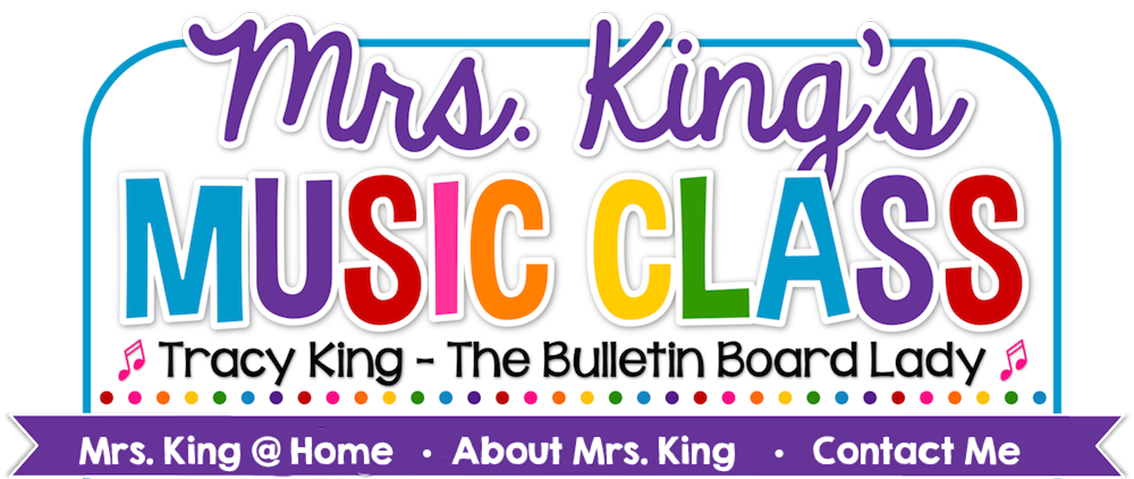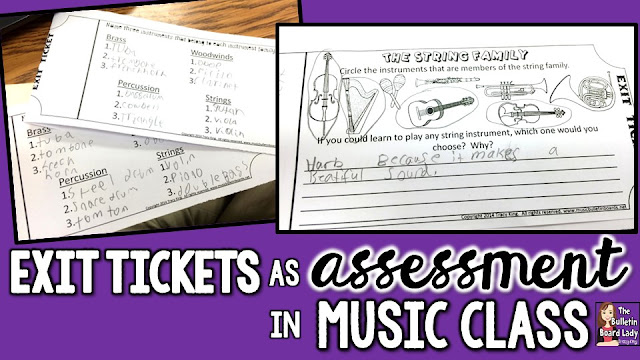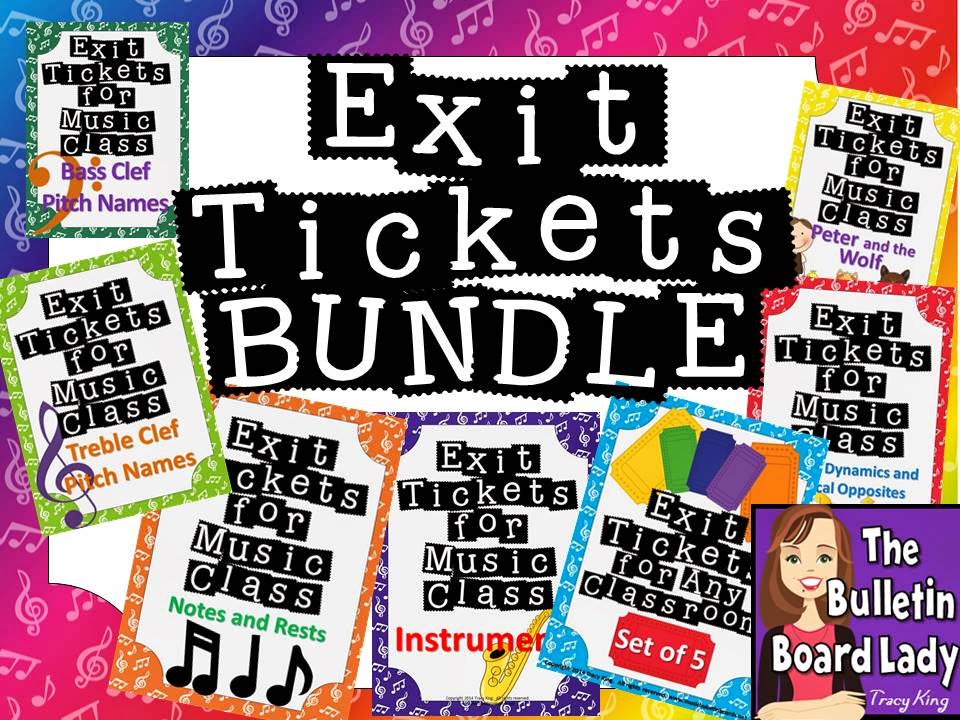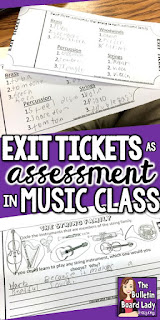Exit tickets are quickly becoming my favorite way to
assess what students have learned in class.
In the districts I have taught I see my elementary students once a week
for 50 minutes. Once a week. *sigh*
That just isn’t enough time! The
students spend more time in the bathroom each week than they do in music
class. With increasing pressure to
collect data and no increase in time, exit tickets have been a life saver.
What are exit tickets?
Exit tickets, exit slips, exit interviews or whatever you
want to call them are short snapshots of student learning. This kind of formative assessment process
provides information needed to adjust teaching and learning while they are
still happening. They can be submitted
on regular paper, orally, on index cards or on specifically made
templates.
Well, yeah but what is so great about exit tickets?
They let teachers know what students have understood and
retained.Have you ever had a class leave and thought “Wow. They didn’t get that at all!” I have. I’ve spent the evening fretting about what I would do next time and how I would present it differently, how we could practice it so that it made sense and wondering if they would even remember any of it. Sometimes my assessment was right on. They needed a bit of remediation as a group and another class period to go over the material. Other times I’ve been flabbergasted at what they remembered. They really DID get it, but just didn’t give me any evidence. With exit tickets, I can ask a simple question like “What is harmony?” or “Tell me three facts about Beethoven.” Their response takes only minutes and I know what they have retained.
They help us and students identify strengths and
weaknesses.
Often our
assessments are through observation and the thought of grading a ton of
worksheets makes us what to shove a pencil in our skull. With
exit tickets I can quickly see who has an understanding of the material. Students will be able to identify material
that they understand or need more help with.
One of my favorite things to do with exit tickets is to ask students to
complete their ticket and then place them in three different piles: “Got it!”
“Sorta.” and “I need more
practice!”
They teach students to think critically.
Students get to analyze what they’ve learned. Depending on the prompt for your exit ticket,
they may also get to apply it to a new situation. I love to give students ownership of their
learning. Once I have created the
expectation of completing an exit ticket at the end of class, some students
think about that during instruction time.
One student even said “I don’t think I understand. I’m gonna write that on my exit ticket so I
remember to ask you about it later.” Be
still my music teacher heart!
Exit tickets allow you to collect data over a period of
time in a time-saving way.
Time is precious.
Every minute counts. Exit tickets
only take a few minutes of your class time but provide data that you can use to
gauge understanding, screen for band and choir, use as recorded grades for
report cards, refer to when referring students for special services and even to
create a little portfolio of student work for parent teacher conferences.| Exit tickets completed by third graders during our instruments of the orchestra unit. These tickets were used after our first class period of learning about the string family. |
Okay! I am ready to get started!
I use to use exit tickets on scraps of paper. You know those copies you have left over when
only 23 kids come instead of 27 and there’s no time to have them make it
up? I took all of those extra copies and
cut them into fourths and put them in a basket.
We used those scrap pieces to write our exit ticket question, problem or
comment on.
Seriously. Taking
the same questions and putting them inside a little ticket graphic IMPROVED the
responses I received from students.
They began writing in complete sentences. They wrote more in each response. They even ASKED to do tickets if I forgot or
if we ran out of time. Epic teacher win.
Tips for Making Exit Tickets Work
1.
PersistenceYou’ve got to do them more than once. Your students need to learn the procedure. Exit tickets are not a “sit there and think and then leisurely write down your answer” kind of activity. Plan a little extra time before doing your first set and describe your expectations. Describe the procedure for getting supplies, putting them up and getting in line. Let them know what success will look like.
2. Have a Plan
I do many writing activities with students so they know the procedure for getting paper, pencils and clipboards and getting to work. I place supplies in places that help traffic flow smoothly. Don’t put everything they will need on one table. Put the pencils and papers in one spot (away from the pencil sharpener if you can) and the clipboards 8-10 feet away. Practice getting supplies in less than a minute. Put a timer up and let students know that you don’t want running and pushing, but that you do expect them to be ready to work by the time the timer has sounded.
3. Keep it Simple
This snapshot of student progress should take 2-4 minutes to complete. Use one or two questions. Write the questions on the board or on the papers they will get. I have created exit tickets for many concepts so I just use what I already have on hand.
4. To Grade or Not to Grade
I do not need a recorded assessment for every class period. I have talked to teachers that are required to have an assessment for every class period and can’t count observation as a means of assessment. In this case I would use exit tickets as a recordable activity every time I used them.
Often, I just look through the exit ticket responses,
make a few notes and toss them. I have
told my students not to expect their return.
If I grade them, I’ll return them.
This saves on time and paperwork.
Are you required to keep student portfolios? These tiny assignments are perfect for that!
5. Don’t Reinvent the Wheel
I’ve created several sets of exit tickets and they are a best seller in my store. Not all of the sets are bundled, but many of them are and occasionally I’ll add to the bundle and bump the price up a dollar or two. Here are some of the sets I have in my store:
Although I'm not teaching choir right now as a class during the day, when I did I often struggled with finding a way to assess students regularly without stealing rehearsal time. These Choir/Singing exit tickets are perfect. Questions about posture, technique and performances are included.
This instrument set is what I use with my 3rd graders every year during our instruments of the orchestra unit. The samples above are from this set.
Many of my students study the "Star-Spangled Banner" each year. These tickets work with a variety of grade levels.
Recorders seem to take every minute of class time and every ounce of my strength to teach. I belt test as part of Recorder Karate, but not every week. With Recorder Exit Tickets I'm able to assess students without a lengthy round of belt testing every time.
The Exit Tickets BUNDLE includes Treble and Bass Clef, Notes and Rests, Instruments, Tempo, Dynamics and Musical Opposites, Peter and the Wolf and a set of general exit tickets that you could use for a variety of topics. This is a growing bundle. Occasionally I will add another set to this bundle and bump up the price a little. This set is great for getting started because it will let you try exit tickets out in a variety of lessons.
Whew! That's a lot of information about exit tickets! I hope that this empowers you to give exit tickets a try in your classroom.






What a great overview! I've used exit tickets occasionally, but this really gives me some reasons to use them more often. I'm most hesitant about getting out supplies and the time that can take, but I appreciated your thoughts on that too. Can't wait to try some more exit tickets!
ReplyDeleteThanks for putting these together! How about a set specific to orchestra? e.g., fingerings on a fingerboard, the open string notes on the staff; up/down bow symbols... That would appeal to many an elementary instrumental music teacher like myself.
ReplyDeleteI love this. I am a recent college grad and I am in a long-term subbing position and I am using exit tickets with my 8th grade class and they are doing amazing things with them. I can honestly say I have learned things from my students by doing exit tickets. What a wonderful thing. I am going to be purchasing these very soon!! Thank you so much for all of your hard work.
ReplyDelete